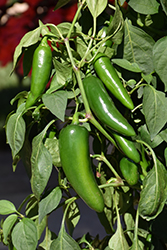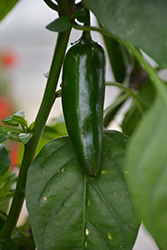Pot-a-Peno Pepper
Capsicum annuum 'Pot-a-Peno'
Height: 15 inches
Spacing: 12 inches
Sunlight:
![]()
Hardiness Zone: (annual)
Group/Class: Hot Jalapeno
Description:
An early maturing, compact variety that cascades beautifully from hanging baskets and patio containers; small, 3" green jalapenos dangle below the dense foliage canopy for easier harvest; mildly hot, a great choice for poppers, adding to nachos or salsas
Edible Qualities
Pot-a-Peno Pepper is an annual vegetable plant that is commonly grown for its edible qualities, although it does have ornamental merits as well. It produces green oblong peppers (which are technically 'berries') which are usually ready for picking from mid summer to early fall. The fruit will often fade to red over time. The peppers have a spicy taste and a crisp texture.
The peppers are most often used in the following ways:
- Fresh Eating
- Eating When Cooked/Prepared
- Cooking
- Baking
- Sauces
Planting & Growing
Pot-a-Peno Pepper will grow to be about 15 inches tall at maturity, with a spread of 20 inches. When planted in rows, individual plants should be spaced approximately 12 inches apart. This vegetable plant is an annual, which means that it will grow for one season in your garden and then die after producing a crop.
This plant can be integrated into a landscape or flower garden by creative gardeners, but is usually grown in a designated vegetable garden. It should only be grown in full sunlight. It does best in average to evenly moist conditions, but will not tolerate standing water. This plant is a heavy feeder that requires frequent fertilizing throughout the growing season to perform at its best. It is not particular as to soil type or pH. It is somewhat tolerant of urban pollution. This is a selected variety of a species not originally from North America.
Pot-a-Peno Pepper is a good choice for the vegetable garden, but it is also well-suited for use in outdoor containers and hanging baskets. It is often used as a 'filler' in the 'spiller-thriller-filler' container combination, providing a mass of flowers and foliage against which the thriller plants stand out. Note that when growing plants in outdoor containers and baskets, they may require more frequent waterings than they would in the yard or garden.

